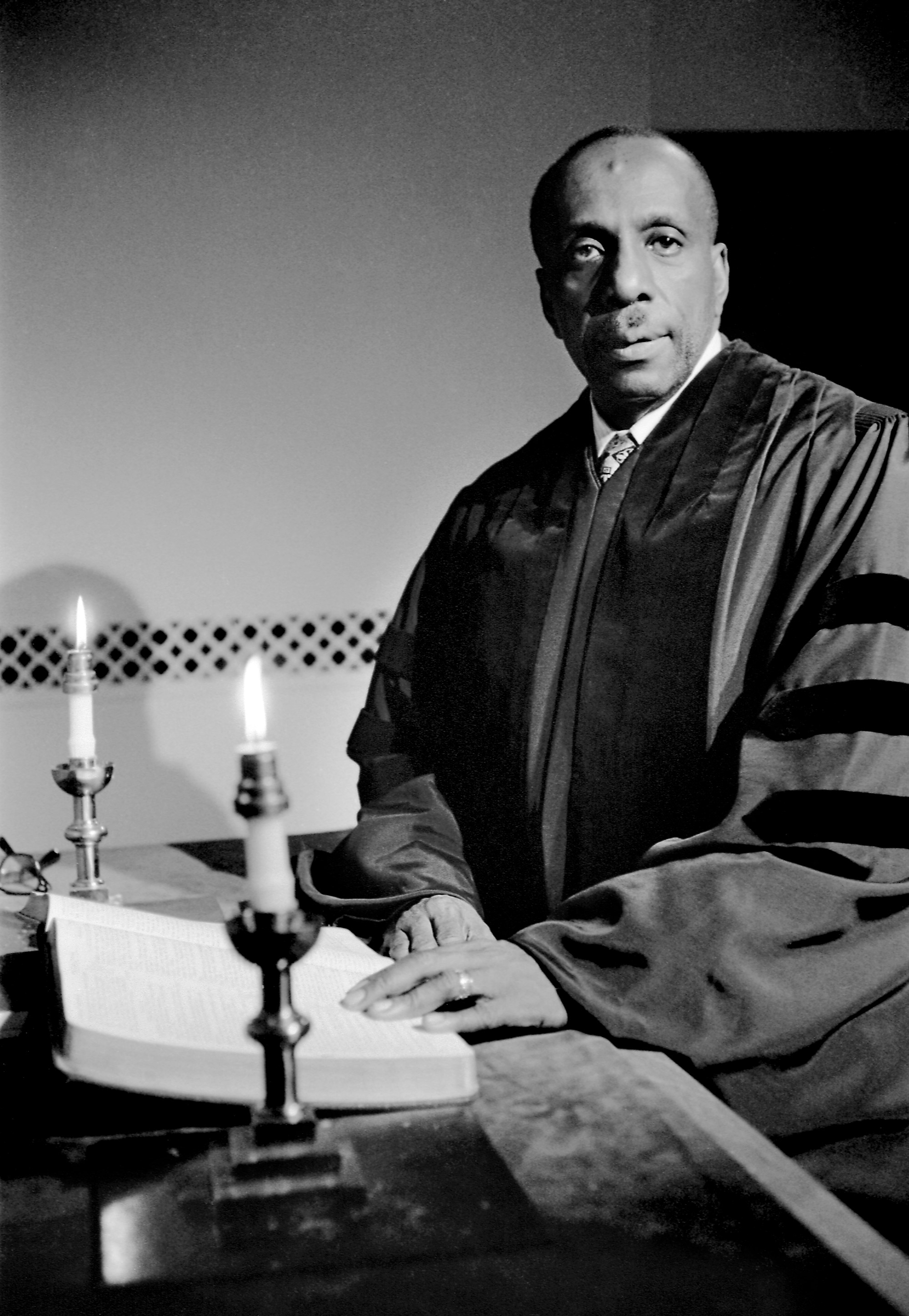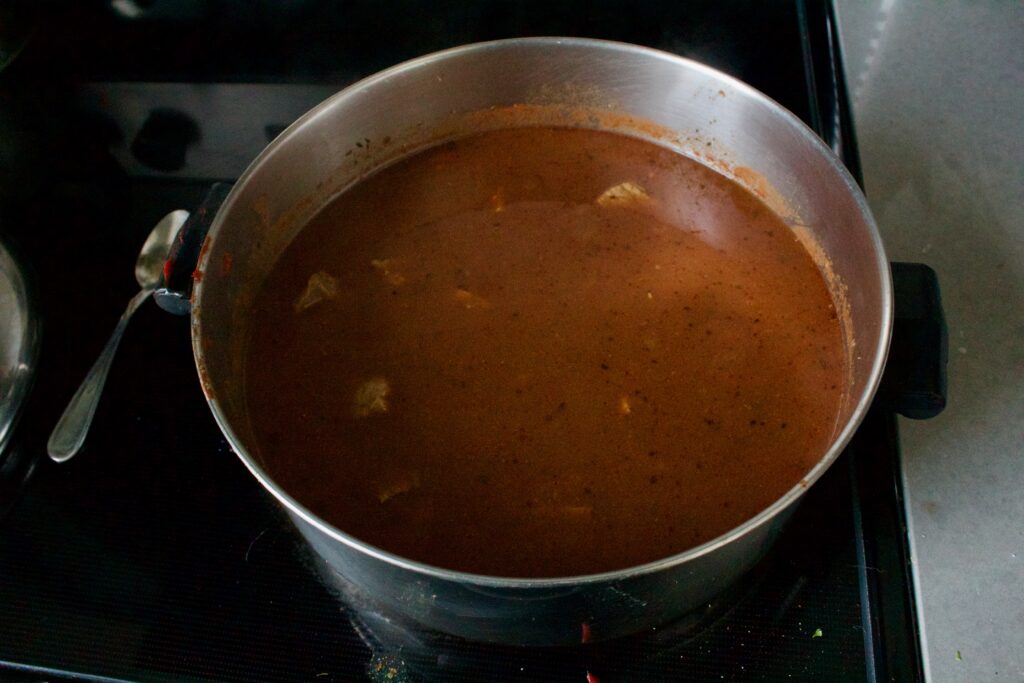This month we encountered another strange quirk of the cookbook: missing dates. Our recipe today has no affiliated date, but rather honors the commencement season during which African American students across the country graduated from high schools, HBCUs, and select white colleges. This submission was made by Howard Thurman, a dean at one of these white colleges, Boston University, who was also married to the editor of the cookbook.
This recipe submission is a bit different as it it not really for Howard Thurman, but “in honor of his mother and grandmother, and all the Negro women of the long past who have striven by dent of sacrifice and hard labor to educate the race.” Thurman’s choice to commemorate the women of his life and the broader Black community is reflective of his support of the NCNW. Nonetheless, we thought we would turn the focus back towards Thurman and take this opportunity to share a bit about his life and work.

From Boston College, Photo by Boston College Photography
Born in Daytona Beach, Florida, on November 18, 1899, to poor parents, Alice and Saul Thurman, becoming the second generation removed from enslavement. Although they did not have much, Thurman left home at 14 years old to attend boarding school in Jacksonville, Florida, because Daytona Beach had no high school open to Black children. After graduating from high school, Thurman went on to graduate valedictorian from Morehouse and attended Colgate Rochester Divinity School.
He became an ordained Baptist minister in 1925, gaining his first pastorate at Mount Zion Baptist Church in Oberlin, Ohio. After this, he began his faculty career by serving as the Director of Religious Life at Morehouse and Spelman College. He then attended Haverford College where he studied with Quaker mystic and leader of the interracial Fellowship of Reconcilation, Rufus Jones. Here began his journey into philosophy and activism that was deeply rooted in faith based pacifism and committed to peace.
Thurman became the Dean of Andrew Rankin Chapel at Howard University, and went on to publish books on his philosophy of activism, beginning with “Peace Tactics and a Racial Minority.” In this famous essay, Thurman controversially depicted the US as a nation characterized by the “will to dominate and control the Negro minority,” a reality that provoked in Black people a “spiritually crippling” hatred of their oppressors. He believed a “technique of relaxation” could break this cycle. These ideas marked not only Thurman’s writings, but his work with students, for which he was known to challenge them to think deeply about being and the values that informed their choices.
Thurman’s pacifism and theology led to national acclaim for his involvement in co-founding an interracial interdenominational church with Presbyterian and professor of philosophy Alfred Fisk. Founded in San Francisco out of concern over the lack of bridges of understanding between different races, cultures, and faiths in American society, Thurman and Fisk established The Church for the Fellowship of All Peoples, in 1944. The inaugural service saw the contributions of a coalition of rabbis, pastors, bishops, and directors of the NAACP and Chinese YMCA. As a new interracial and interfaith space, their strove to create a “place of worship where all people are affirmed as children of God.” Deeply committed to spiritual unity and the destruction of prejudices that separate peoples, the church still persists today, continuing toward the goal of social transformation that Thurman and Fisk began.
“The movement of the Spirit of God in the hearts of [people] often calls them to act against the spirit of their times or causes them to anticipate a spirit which is yet in the making. In a moment of dedication, they are given wisdom and courage to dare a deed that challenges and to kindle a hope that inspires.”
Howard Thurman, footprints of a dream
Thurman’s activism was definitively international. In 1936 he led a “Negro Delegation of Friendship” to South Asia, where he met with Indian anti-colonial activist, lawyer and political ethicist Mohondas Ghandi. This connection with Ghandi broadened his theological and international vision of the struggles of Black Americans, and deepened his commitment to non-violent action as a mechanism for social change.
After several years in the Bay Area, Thurman and his wife Sue Bailey Thurman, moved to Boston, Massachusetts to serve as Dean of Marsh Chapel at Boston College. This made him the first African American Dean at a predominantly white institution in America. He went with a vision of testing his ideas of common ground and community in pluralism. Here he met and mentored Martin Luther King Jr., who learned much of his nonviolent principles from Thurman. While Thurman shaped much of the nonviolent action of the Civil Rights Movement, he did not himself take to marching and mobilizing on the streets. Instead, Thurman served as a caretaker and spiritual advisor to those who did, including Martin Luther King Jr., Jesse Jackson and Marian Wright Edelman.
The Dish: June Commencement Soup

Ingredients:
3 pounds of beef stew cut in 1” cubes
1 cracked soup bone
1 quart liquid (soup stock or water with bouillon cube)
1 tablespoon worcestershire sauce
1 small can tomato paste
2 ½ teaspoons salt
½ teaspoon freshly ground black pepper
2 green peppers (uncut)
1 tablespoon soy sauce
4 onions quartered
4 large white potatoes
½ teaspoon of the following herbs (see symbolism chart below):
Marjoram (joy)
Basil (wisdom)
Thyme (courage)
Chives (usefulness)
Parsley (festivity)
Other vegetables according to taste and season
As you can see, the ingredient list has a variety of herbs, each of which are loaded with symbolic meaning. The book includes this chart of the symbolism of the myriad of herbs we could add and what meaning it would add to the soup.
From Cookbook of the American Negro, NCNW
While I looked for the origins of these symbols, there are a variety of religious and cultural roots from ancient times to modernity.
This recipe process was incredibly simple. A one pot dish of sorts that really just required time.

We started by placing the cut beef cubes into a quart of stock, alongside our chosen herbs, salt, pepper and tomato paste. After covering, we brought it to simmer over low heat for the directed 2 hours.
After two hours the meat was not quite tender, so we continued to stew it for another hour. Eventually we added the chopped vegetables and continued to allow the stew to simmer for another few hours. We decided to add some more herbs and even ended up adding some red wine to make it a richer and more flavorful stew.


I have to admit, while this was straightforward, the recipe really needed more time and more seasonings to make it the stew we ended up enjoying.
Final Thoughts
As we mentioned, this was intended for the celebration of commencement and in honor of Howard Thurman’s mother, grandmother, “and all the Negro women of the long past.” Thinking of these women, the time it required to bring it to perfection felt entirely appropriate for the generations of women who shaped Reverend Howard Thurman.
